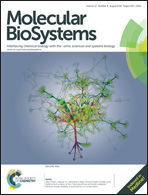A systems biology approach to reconcile metabolic network models with application to Synechocystis sp. PCC 6803 for biofuel production†
Abstract
Production of biofuels has been one of the promising efforts in biotechnology in the past few decades. The perspective of these efforts can be reduction of increasing demands for fossil fuels and consequently reducing environmental pollution. Nonetheless, most previous approaches did not succeed in obviating many big challenges in this way. In recent years systems biology with the help of microorganisms has been trying to overcome these challenges. Unicellular cyanobacteria are widespread phototrophic microorganisms that have capabilities such as consuming solar energy and atmospheric carbon dioxide for growth and thus can be a suitable chassis for the production of valuable organic materials such as biofuels. For the ultimate use of metabolic potential of cyanobacteria, it is necessary to understand the reactions that are taking place inside the metabolic network of these microorganisms. In this study, we developed a Java tool to reconstruct an integrated metabolic network of a cyanobacterium (Synechocystis sp. PCC 6803). We merged three existing reconstructed metabolic networks of this microorganism. Then, after modeling for biofuel production, the results from flux balance analysis (FBA) disclosed an increased yield in biofuel production for ethanol, isobutanol, 3-methyl-1-butanol, 2-methyl-1-butanol, and propanol. The numbers of blocked reactions were also decreased for 2-methyl-1-butanol production. In addition, coverage of the metabolic network in terms of the number of metabolites and reactions was increased in the new obtained model.


 Please wait while we load your content...
Please wait while we load your content...